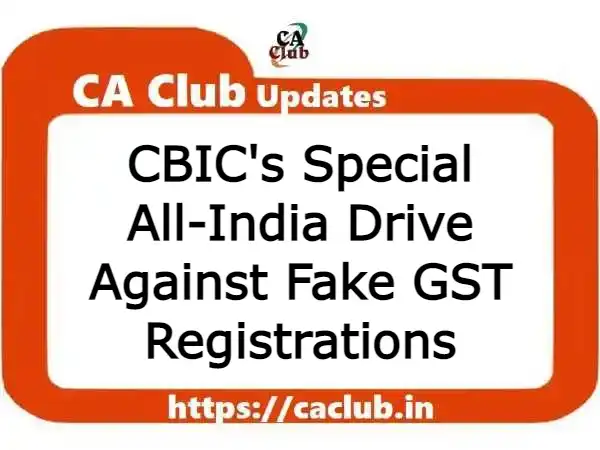In an effort to combat fraudulent activities and protect government revenue, the Central Board of Indirect Taxes and Customs (CBIC) has launched a Special All-India Drive against fake GST registrations. Accordingly, CBIC has issued necessary guidelines/instructions, with an aim to detect and eliminate fraudulent GSTINs from the GST ecosystem. This article provides an overview of the drive’s objectives, timeline and guidelines for a coordinated approach to tackle this growing menace.
CBIC GST Instructions 1/2023 dated 04/05/2023: Guidelines for Special All-India Drive against fake registrations
Special Drive Period
The Special All-India Drive will be conducted from 16th May 2023 to 15th July 2023 by all Central and State Tax administrations. During this period, they will work together to identify and verify suspicious or fake GSTINs and take necessary remedial actions.
Fake Registrations and ITC Issues
In a National Co-ordination Meeting held on April 24, 2023, various system-based and policy measures were discussed to tackle the issue of fake registrations and input tax credits. Fraudsters have been using fake registrations to pass on input tax credit to unscrupulous recipients through invoices without any actual supply of goods or services.
Modus Operandi of Fake Registrations
Several methods for obtaining fake registrations have been identified by Central and State Tax administrations. Some cases involve the use of forged documents, such as electricity bills, property tax receipts and rent agreements as proof of the principal place of business to obtain GST registration. In a recent case, Gujarat State Tax authorities detected fraudsters obtaining fake GST registrations using PAN and Aadhaar numbers of economically weaker individuals without their knowledge.
Guidelines for the Special Drive
The CBIC has issued several guidelines for the Special All-India Drive to ensure uniformity and effective coordination:
i) Identification of fraudulent GSTINs: GSTN will identify fraudulent GSTINs using data analytics and risk parameters and will share the details with the concerned State/Central Tax administrations for verification and action.
ii) Information Sharing Mechanism: A nodal officer will be appointed by each of the Zonal CGST Zone and State to ensure seamless flow of data and coordination with GSTN, DGARM and other tax administrations.
iii) Action by field formations: Upon receiving data from GSTN/DGARM, a time-bound verification of suspicious GSTINs will be undertaken by the concerned jurisdictional tax officers. If a taxpayer is found to be non-existent and fictitious, the tax officer will initiate action for suspension and cancellation of the registration.
iv) Feedback and Reporting Mechanism: State and CGST Zones will provide an action taken report to the GST Council Secretariat on a weekly basis. Novel modus operandi detected during the verification process will also be reported.
v) National Coordination Committee: This committee, headed by Member [GST], CBIC and representatives from various tax administrations, will monitor the progress of the special drive. The GST Council Secretariat will compile reports and make them available to the National Coordination Committee.
Conclusion
The Special All-India Drive against fake GST registrations is a vital step towards ensuring the integrity of the GST ecosystem. By leveraging data analytics, risk parameters and coordinated efforts among tax authorities, the CBIC aims to identify and eliminate fraudulent GSTINs, safeguarding government revenue and promoting transparency within the system.
Related Posts:
CBIC Instructions for Processing GST Registration Applications 2023
